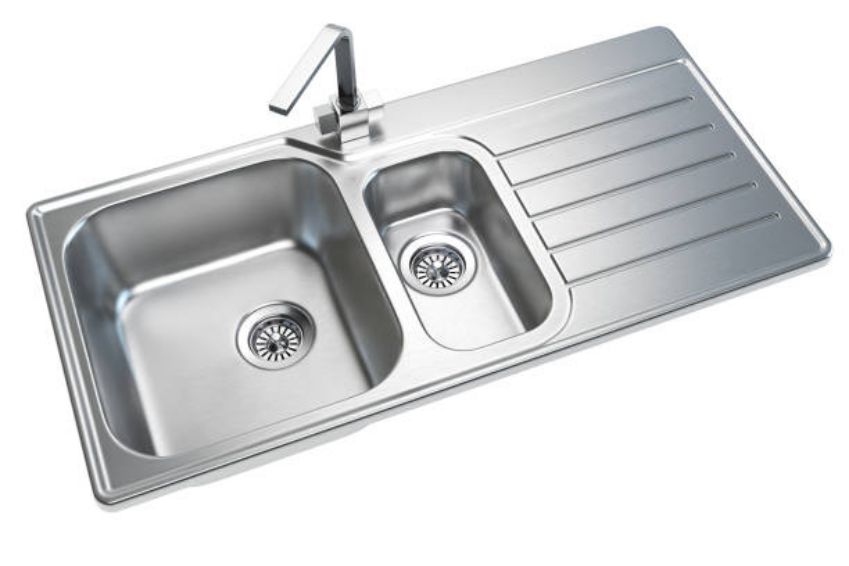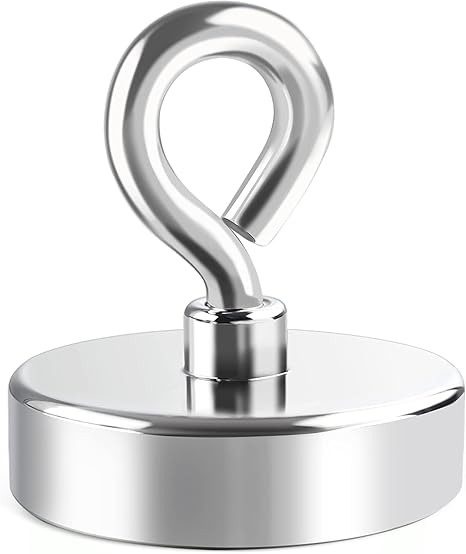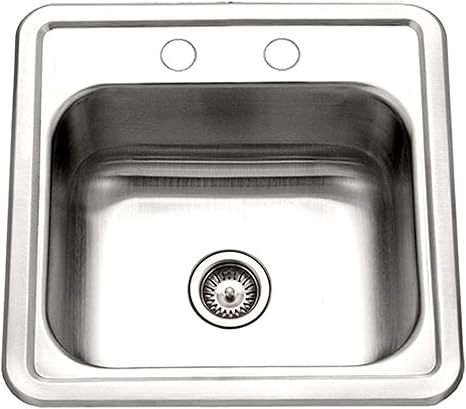When buying or selling a kitchen sink, many people recommend either magnetic or non-magnetic sinks. The possibility of magnetic sinks is a major unknown. And so is the full scope of what it entails to own a magnetic sink.
Table of Contents
Are Kitchen Sinks Magnetic?
Magnetic and non-magnetic kitchen sinks are available. Non-magnetic stainless steel sinks are available. The amount of iron or ferromagnetic content in the metal is the primary cause of the magnetic properties of a sink. Non-magnetic metal sinks are the best because they rust less easily.

The amount of iron in a metal determines whether it is ferrous or non-ferrous. And ferrous metals are “ferromagnetic.” Because of their strong attraction to magnets, nickel, cobalt, and their alloys are also ferromagnetic. As a result, these metals will cling to magnets.
It is also affected by the percentage of ferromagnetic content in the metal. A metal alloy with low iron content is not magnetic in general.
Plastics are nonmagnetic materials, as far as we know. Magnetic plastics, on the other hand, do exist. Their properties are used in the technology, food, automotive, and medical industries. This is possible due to the plastic structure’s binding of ferromagnetic elements. While innovative, their applications do not include household appliances such as kitchen sinks.
Does the Kitchen Sink Magnet Test Work?
Many people recommend performing a magnet test to determine whether the sink is made of stainless steel or whether it is a high-quality stainless steel sink. However, the magnet test does not always provide an accurate answer.
High-quality stainless steel sinks typically contain ferromagnetic content within the metal. It may also have a nickel coating on the top of the sink to prevent corrosion. As a result, the metal is non-magnetic or only slightly magnetic in a few places.
The magnet will only work for you if the stainless steel contains less ferromagnetic content. This also means that a stainless steel sink with more magnetic activity is more likely to rust.
How Can You Determine Whether a Sink Material Is Magnetic or Not?
You’ll need the following items:
- A powerful magnet
- Clear the sink
To determine whether your sink material is magnetic or not, perform the following tests:
- Hover your magnet over the top of the sink to see if it attracts anything. To be sure, go all the way around the surface.
- Check to see if it sticks. If it does, this indicates that the top layer is magnetic.
- Check to see if the magnet sticks or falls off the underside of your metal sink if it is not covered.
- Try it from a few different perspectives. The bottom layer is magnetic if it does not fall.
The reason you should examine different areas of the sink’s surface is that the sink may be partially or only slightly magnetic.
If it immediately sticks, there is a significant lack of nickel in the steel. Because there is less corrosion resistance, the sink is more likely to rust.
How Can You Tell If Your Sink Is Made of Stainless Steel?
So, if you want to see if a sink is made of stainless steel, you can use the following methods:
Search for the model or serial number.
If your sink hasn’t become too battered or dull, the model number or serial number is probably still legible. Most commonly, these are engraved in ink or labeled on the basin’s underside. You can then look them up online or contact the manufacturer for more information.
Compared to other stainless steel appliances
If Step 1 doesn’t work, the next best thing is to compare it to a known appliance! You’ve most likely got a stainless steel pot or knife lying around the house. Check to see if you can spot the following parallels:
Take a look at the shine
Even after washing, stainless steel retains its shine. Other metals, such as aluminum, become a little duller after a trip through the dishwasher. To gain a better understanding, observe how the shine on your comparison element remains.
Examine the sound
Stainless steel has a distinct ring to it. Compare it to non-stainless steel metal by tapping it with a wooden spoon. However, keep in mind that dimensions, shape, and so on all have an impact on the sound.
Scratch the surface with a key
If you’re willing to compromise on its appearance, try scratching the underside of your sink with a key. Stainless steel is a tough material, and most high-quality stainless steels are scratch-resistant.
Use a magnet to check (least effective)
You can use the magnet test to determine whether or not your sink is made of stainless steel. This method works best when you’re trying to determine whether your sink is made of aluminum or another non-magnetic metal. If you’re certain that the only magnetic material that can be used is stainless steel, then go for it.
If everything else fails, you can always consult a professional.
Which Stainless Steels Are Magnetic?
As a general rule, we consider the following three types of stainless steel to be magnetic:
- Ferritic Stainless Steel
- Martensitic Stainless Steel
- Duplex Stainless Steel
The amount of ferrite is the most important factor to consider. Stainless steel must contain ferrite to be ferromagnetic. In layman’s terms, examine the amount of iron and iron compounds in the metal.
The more ferrite a metal has, the more magnetic it is. It’s all about the ratios, though. When there are too many austenitic elements in the steel, which are mostly non-magnetic, the steel is not magnetic.
What Stainless Steel Doesn’t Magnetize?
Magneticity does not exist in austenitic stainless steel. These are alloys of chromium, nickel, and iron (sometimes with manganese). They are nonmagnetic due to their structure, heat treatment, and the presence of nickel.
Some austenitic steels may be magnetically weak. It is determined by the amount of cold work and steel formation.
How Do You Know If Stainless Steel Is Good?
Here are some indicators that your stainless steel is of high quality:
Examine the chromium and nickel ratios
There is no stainless steel that is completely corrosion-proof. That is not how chemistry operates. However, austenitic stainless steels (with nickel) are typically regarded as “good quality.” This is due to its durability and corrosion resistance. Cold work fortifies these steels, making them extremely durable. And the nickel helps to keep rust at bay.
However, not all austenitic steels are created equal. You may discover that high-quality ferritic steel performs better.
Examine the gauge (thickness)
Thicker stainless steel is typical of higher quality. We use the term “gauge” to describe the thickness of stainless steel. The exact figures may vary depending on your requirements. For kitchen sinks, for example, 16 or 18 is the recommended temperature.
Examine the finish
Because of their scratch resistance, satin and matte-like finishes typically indicate higher quality steel. However, this method is not the most accurate. Weaker steel can have the same finish as stronger steel. However, high-end products are more concerned with minor details.
Vinegar examination
The vinegar test is a cool (though risky) tip that might work for you. Maintain contact between the steel and some vinegar. Try some regular vinegar to see how it tastes. Then, try the one who is currently in contact with you.
If it tastes strange or metallic, it’s probably not high-quality steel. This is due to the acid in vinegar reacting with the steel. Chemically, good stainless steel is unreactive.
What Stainless Steel Grade Is Best for a Kitchen Sink?
The best stainless steel grades are 304 and 316, which have excellent chromium and nickel compositions.
The 18/8 mark on grade 304 indicates that it contains 18% chromium and 8% nickel. It’s ideal for kitchen sinks in general.
Grade 316 has a 16/10 rating, which means it contains 16% chromium and 10% nickel (with 2% molybdenum for added resistance to salt-like chlorides). If you’re going to use a lot of saltwater, this is the way to go.
Because of its rust resistance, higher nickel ratios generally indicate higher quality stainless steel.
Why Is Stainless Steel Beneficial for Sinks?
The following are the advantages of using stainless steel in sinks:
It will not rust
Of course, we’d get stainless steel if that wasn’t the case. It’s right there in the name! Its main selling point is its rust resistance. And it’s one of the best options for sinks where there’s a lot of contact with water.
It’s long-lasting
The alloy is designed to last. Stainless steel is one of the most durable sink materials. It is difficult to dent, and it will not break, crack, or chip off.
It is inexpensive
You will not be disappointed whether you choose the low-cost option or the high-priced option. Stainless steel does exactly what it says it does: it is long-lasting and corrosion-resistant. The better the quality, the longer the product will last.
It’s simple to keep up with
Discoloration and scratches are common with porcelain and plastic. Stainless steel is not one of them. It can withstand harsh cleaning chemicals as well as wear and tear. The gleam will also not fade easily.
It has a more adaptable design
Because of the inherent structure that makes stainless steel both flexible and strong, larger or more bowl-like designs are possible. This reduces the amount of water that splashes around. Stainless steel outperforms cast iron and heavier metals in this category.
It isn’t as loud as you might think
Once upon a time, one of the most noticeable disadvantages of stainless steel was the loud clanging sounds it made. However, with modern technology and design that incorporates insulating pads, this is no longer a concern. Stainless steel is also thicker these days, so it is naturally more sound-absorbent.
It has a longer lifespan and is, therefore, more environmentally friendly
It’s a green and long-lasting investment for your home because it will last you 15 to 30 years.
A Chart of Magnetic Stainless Steel Grades

When it comes to the magnetic property of kitchen sinks, there’s more to it than meets the eye. It can be used to determine the quality of stainless steel. We can choose more durable appliances for our homes if we know more about why metal is attracted to magnets.




